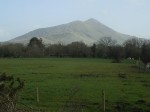This is from chapter 1 of The Wayfaring Stranger. It tells of how my great-great-great grandfather Joseph Moore had to leave his home in Westport, Ireland as a teenager in 1849.
Along with the garden, these sheep were the livelihood of his sister and himself. They were so precious that he brought them nightly into the dirt-floored cottage.
That was exactly why the sounds Joseph heard filled him with fear: Dreadful bleating mixed with loud yelping came from the adjacent field. Shovel in hand, Joseph ran toward the noise. What he saw as he reached the stone wall sickened him: A pack of four dogs was attacking the sheep.
As is their nature, the sheep were huddled helplessly in the corner of the stone wall. Blood poured from the neck of one of the ewes as a young lamb lay twitching in convulsions of death beside her.
Joseph sprinted toward the dogs filled with sudden rage, shouting as he waved his shovel. All but one of the dogs loped off. That dog, a big yellow hound, did not run but rather bit down on the neck of the other lamb. Angrily, he struck the dog across the back with his shovel. The snarling dog turned on him and with lightning quick speed latched onto his right leg.
Joseph let out a painful yell and felt a blind rage. He began to strike the dog repeatedly on the head. It quickly released its grip on his leg and fell yelping in pain.
The dog lay with blood pouring out of its mouth and one ear. Even after he had hit the dog enough to kill it, he continued a steady rain of blows. It was as if all the anger—from the heavy-handed abuse of the landlords, the potato failure, the constant hunger and poverty, the unending death of family and friends—seemed to pour forth from him and be directed at the body of the prone dog.
Joseph’s green eyes were filled with a burning passion and rage. Breathing heavily, he knelt down beside the three dead sheep and the dying dog. His leg throbbed from the dog bite. He looked at the dead sheep, tears filled his eyes as he realized what this meant for him and his sister. He hung his head as tears poured down his cheeks, seemingly finally beaten down by the hard life of this difficult time.
As Joseph knelt over this tragedy, he had no idea an observer had watched the entire episode. This witness to the attack also knew to whom the dogs belonged. They were the property of the English land agent, Smith, who oversaw the rental land near Westport. The dead dog, lying by Joseph, was the man’s prize hunting hound. The observer also knew the land Joseph lived on was part of Smith’s land holdings.
The silent observer didn’t wait long to send word to the Englishman Smith’s estate about the Irish peasant who had killed his best dog. As in any rural town anywhere, most of the village knew about the encounter by noon that day. Not only did the news of the incident spread, but also Smith’s echoing threat to kill the boy who had dared to kill his best hunting dog.
When a neighbor ran to tell Joseph’s sister, Bridget, of this threat, terror filled her heart. Everyone knew this wealthy English land agent meant what he said and was used to getting his way. She was not surprised that the nobleman would place a hunting dog above the life of a mere Irish peasant boy. Bridget remembered last year how Smith had allowed the public flogging of a salmon poacher caught trespassing on his private river. The resultant beating was so severe that the man nearly died. When townspeople complained of the flogging’s brutality, Smith’s icy comment was, “I bet the next man who thinks about trespassing will be reminded to stay out of my river!”
Recalling this, Bridget took her younger brother by the shoulders, “Brother, ye must go. Run for yer life! Only death awaits ye here. Aye, Go—Go now!” She tenderly kissed him as she pushed him on his way, “God bless ye, Joseph. May God lead ye away from this horrible place.”
Her push was not one moment too soon. As he went out the back door, four men approached about two hundred yards away. Joseph, easing along the side of the house, recognized Smith first. On each side of him were British soldiers. One of the soldiers had two trac

king dogs on leashes. A fourth man dressed in civilian clothing cradled what appeared to be a shotgun.
This event led to him stowing away on a ship in Westport Harbor and eventually landing in New Orleans.
From The Wayfaring Stranger by Curt Iles
 Creekbank Stories Curt Iles, Storyteller
Creekbank Stories Curt Iles, Storyteller
